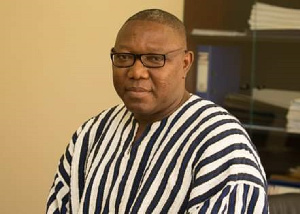 Deputy Ranking Member on the Education Committee of Parliament Dr. Apaak
Deputy Ranking Member on the Education Committee of Parliament Dr. Apaak
Deputy Ranking Member on the Education Committee of Parliament, Dr. Clement Apaak, has questioned why the Education Minister Dr. Yaw Adutwum has directed some 46 colleges of education to bear the cost of the free Wi-Fi package provided for them by the government.
The Education ministry has in a letter to Busy Internet, told the installers of the internet package to start billing the various colleges of education.
The Minister in his letter stated that the cost was overburdening the free senior school budget hence the various colleges must pay for their own internet services.
But reacting, the Minister is questioning why the government would draw money from the free SHS budget for such a policy and later say it was no longer secured to do so.
To him, Vice President Dr. Mahamudu Bawumia must be held liable for peddling lies when he launched the initiative last year and promos d Ghanaians that schools and colleges were to benefit from the free Wi-Fi initiative.
He said “Bawumia in November 2020 announced that in addition to the provision of free WiFi for all 722 SHS, all 46 Colleges of Education and 246 District Directorates of Education will also benefit from the free WiFi as well. So what has changed? Didn’t he know that funding for the provision of the free WiFi to the Colleges was not secured and or was being drawn from the Free Senior High School purse?
“Does this mean Bawumia deceived Ghanaians and students in the Colleges of Education when he said they will enjoy free WiFi? How would the Colleges fund the WiFi? Where will they get the funds to pay for the initial installation and for the services they have already enjoyed because they believed was free?
“Will the students be billed for no fault of theirs? The government ought to foot the bill for the installation and already consumed service, not the Colleges and students”, the legislator for Builsa South added.
The MP said: “And if I may ask further, under what arrangements are the Universities enjoying free WiFi while Colleges of Education, made to believe would also enjoy same are being asked to pay. Can’t the Colleges of Education, which are also tertiary institutions be allowed to enjoy the free WiFi under similar or same arrangements as the Universities?”
Background
Vice President Dr. Mahamudu Bawumia in 2020 commissioned the government’s flagship Free Wi-fi for Tertiary Institutions Project in Accra.
The project forms part of the government’s ongoing program to provide Free Wi-fi to all 722 public Senior High Schools and other educational institutions.
The initiative he said in that year was to cover 46 Colleges of Education, and at least 15 traditional Public Tertiary Institutions across the country, 13 of which are in the operational zone of ECG.
The two other public tertiary institutions, University of Development Studies (UDS), Tamale and the University of Energy and Natural Resources (UENR), Sunyani as well as the campuses of newly created University Colleges in northern Ghana, were to be served by the Northern Electricity Company (NEDCO) in collaboration with GRIDCO and NITA because they did fall under ECG.
The 13 beneficiary institutions are: University of Ghana, Legon; Kwame Nkrumah University of Science and Technology, Kumasi; University of Cape Coast, Cape Coast; University of Education, Winneba; Ghana Institute of Management and Public Administration (GIMPA), Accra; the University of Health and Allied Sciences (UHAS), Ho; University of Mines and Technology (UMaT), Tarkwa; and University of Professional Studies, Accra (UPSA).
The rest are Regional Maritime University, Accra; Ghana Technology University College (GTUC), Accra; Ghana Institute of Journalism, Accra; Ghana Institute of Languages, Accra and National Film and Television Institute (NAFTI), Accra.
He had also announced that the Free Wi-Fi was to cover all tertiary and secondary institutions from next year.
The beneficiary institutions include, but are not limited to all Technical Universities, all Colleges of Education, all Nursing Training Colleges, and all Senior High Schools.